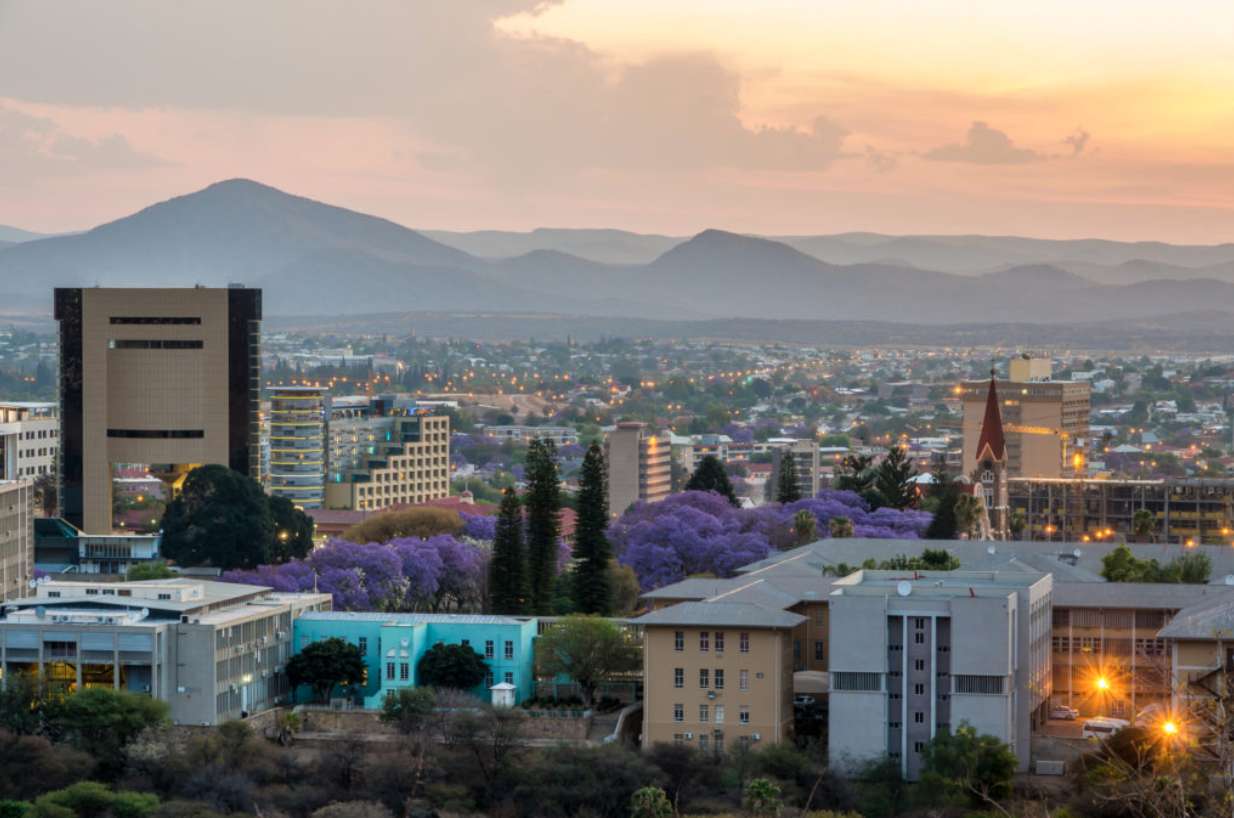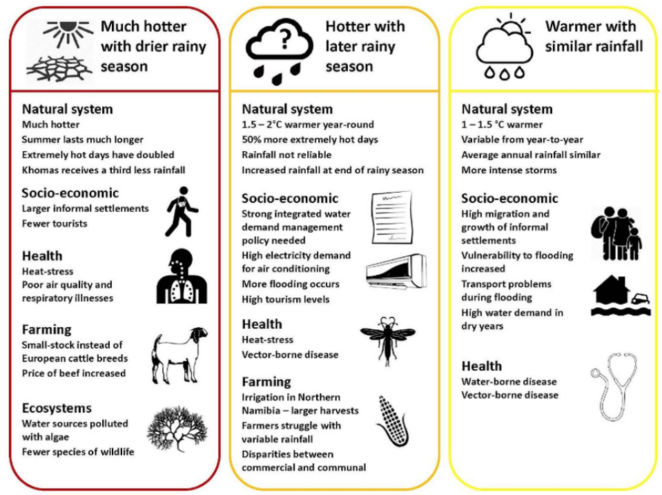Co-producing climate information for Windhoek decision making

Introduction
Windhoek is a fast growing city situated in an extremely dry region. There are many decisions facing those tasked with managing Windhoek, and the resources it relies on, that are climate sensitive. Two issues identified to be priority concerns in light of climate variability and change are those of water insecurity and inadequate services in informal settlements (notably water, sanitation and energy services).
This working paper consolidates work undertaken as part of the Future Resilience for African CiTies And Lands (FRACTAL) project on co-producing, communicating and sharing climate information of relevance to these issues and climate sensitive decisions being faced in Windhoek. Specifically, the paper describes the concept of climate risk narratives (CRNs), how these narratives are developed (and co-developed), and how they have been used to incorporate climate science into climate-sensitive decision-making processes. You can find out more about the uses, limitations, caveats and recommendations on their use here. The first episode of the FRACTAL podcast discusses CRNs in great detail. Finally, you can read this articlewhich is a story about the 2015 to early 2017 Windhoek drought in the context of climate change while using the narrative approach.
The paper provides an overview of the work undertaken and identifies gaps and needs that have not yet been filled or met. It offers suggestions for possible priorities for future research and capacity-strengthening activities. The paper also serves as a resource for those seeking the Windhoek-specific climate data and information analysed, produced and made available through the project.
*Download the full publication from the right hand column. The key messages from the publication are provided below. See the full text for much more detail.
Methods and Tools
The FRACTAL project has used climate risk narratives to support the co-production of climate information. Climate Risk Narratives (CRN) were first used for summarising climate projections within the South African 3rd National Communication. The use of CRNs was further developed in the first phase of FRACTAL, where they were used to describe plausible future climates and related risks in ways that were both understandable and meaningful to decision makers in a specific context.
The construction of climate risk narratives (see section 4 of the full text) is designed to qualitatively combine climate science evidence, which is often diverse and sometimes contradictory, with context specific information and knowledge through a co-production process, involving a range of academic and societal stakeholders.
In FRACTAL, the key role of CRNs was to act as prompts or ‘conversation starters’ between scientists, decision makers, technical advisors and those impacted and affected by climate conditions, allowing the climate evidence and associated uncertainty to be communicated, questioned and explored in an accessible and relevant manner.
Through the FRACTAL city engagements, such as the Learning Labs, City Dialogues and training workshops, CRNs have emerged as “boundary objects”, or collaborative learning tools that facilitate engagement across disciplinary and practice boundaries. They help to overcome the communication barriers in transdisciplinary engagement through the building of transparency and trust by enabling focused conversation and deliberation across the science-policy-practitioner spectrum on climate sensitivities and impacts facing the city.
The Windhoek climate risk narratives
The Windhoek CRNs describe three plausible future climates for the 2040s, which were derived through analysing climate projection outcomes for Namibia using multiple sources to ensure a wide range of plausible future climates was captured. The three future climates were described using the following headline messages:
- Much hotter with a drier rainy season
- Hotter with rainfall later in the season
- Warmer with a similar rainy season
The CRNs then describe how these three future climate scenarios may impact the relevant sectors and livelihoods in Windhoek, such as water security, energy, health, biodiversity and ecosystem services.
For water security, all three climate scenarios lead to increased evaporation due to higher temperatures, which impacts water availability in reservoirs and dams. This impact is compounded by population and economic growth in the Windhoek municipal area, both from internal growth and migration into the city. Adaptation options could include improved and expanded water treatment facilities to increase water reuse and the use of desalination plants, although desalinated water comes at a very high cost. Click here to find out more about the Story of Water in Windhoek.
For energy efficiency and supply, scenarios 1 and 2 could lead to more sunshine hours due to less cloud cover, resulting in an increase in the production of solar power and thereby a quicker return on investments in solar energy infrastructure. All three scenarios could lead to an increased demand in air conditioning due to higher temperatures. Options for adaptation include promoting municipal and national programmes and policies for renewable energy, smart grids and promoting energy-efficient technologies and practices.
For the health sector, all three scenarios could lead to increased occurrence of heat-related health issues such as heat stress/ stroke. Access to clean sanitation, related to the risk of exposure to water-borne diseases, could be negatively affected in scenarios 2 and 3 due to the risk of flooding. Adaptation options include conducting public health campaigns in vulnerable communities, improving sanitation services and expanding clinic facilities.

Future research priorities
One future direction for this work will be to address additional needs for climate data, information and knowledge that may emerge as the operational details of the plan are worked out to implement specific measures.
More research is also needed to better understand the complex ways in which scientific climate information interacts with various other factors to shape policy and planning outcomes, as a basis for enhancing climate service offerings and improving context-relevant approaches to support evidence-based decision-making at the urban scale. One aspect of such research is exploring how citizen science with urban residents, especially those living in informal settlements experiencing climate impacts, might contribute to shaping not only household decisions but also government policy and planning decisions.
Suggested Citation
Janes, T., Taylor, A., and Bharwani, S., (2020). Co-producing climate information for Windhoek decision making. FRACTAL [Future Resilience for African CiTies And Lands ] Working Paper.
Further readings
Related resources
- FRACTAL project website
- FRACTAL: Future Resilience for African Cities and Lands
- Namibia Climate Change Adaptation Booklets
- Africa's Climate: Helping decision-makers make sense of climate information
- An Embedded Researcher approach to integrate climate information into decision making in southern African cities: lessons from F
- Learning within & about climate science: What has transdisciplinary engagement through FRACTAL taught us?
- FRACTAL Learning - Adaptation Inspiration Cases in Africa Summary
- Learning Labs in Windhoek: creating collaborative ways to address climate change in African cities
- Transdisciplinarity, co-production, and co-exploration: integrating knowledge across science, policy and practice in FRACTAL
- Climate risk narratives: An iterative reflective process for co-producing and integrating climate knowledge
- Climate narratives: What have we tried? what have we learned? What does this mean for us going forward?
- The Story of Water in Windhoek: A Narrative Approach to Interpreting a Transdisciplinary Process
- FRACTAL Podcast Series - Exploring transdisciplinary approaches to support resilience and adaptation decision making
(0) Comments
There is no content